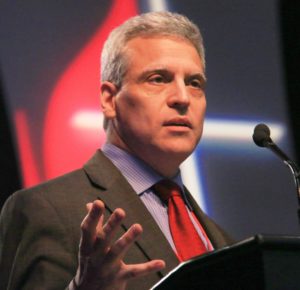 By the Rev. Joseph F. DiPaolo*
By the Rev. Joseph F. DiPaolo*
With the 2019 session of General Conference just months away, many United Methodists are seeking information on the various plans and petitions to be considered in St. Louis.
Our bishops and other leaders have expressed support for the so-called “One Church Plan,” which would remove existing language in the Book of Discipline on sexuality and marriage. It would let every annual conference and local church choose their own paths. Supporters say that this is the best way to move us forward in ministry together, and treat fairly all parties and perspectives.
I disagree. Here is why the One Church Plan is a bad idea:
- It will bring conflict and division to nearly every local church. The UMC is a conciliar church. That means we seek to discern the will and leading of God corporately, deliberating together in delegated governing bodies we call conferences, with General Conference the highest authority.Local churches may agree or not, but they have had no authority to change our teachings or policies. The One Church Plan changes that. The conflict, which has proven so divisive at the conference level, will now be pushed down to every local church. Most of our churches contain people on both sides of the issue. Hundreds of congregations in every conference could lose twenty, thirty or forty percent of their membership, if compelled to debate and vote on the meaning and practice of marriage.
- It disfranchises the laity. Under the plan, the decision of annual conferences, whether or not they will ordain and deploy practicing homosexuals as pastors, will be made by the clergy. The executive session alone of each annual conference will vote on the issue, which consists almost entirely of clergy (plus some laity from the Board of Ordained Ministry).The laity will be almost entirely shut out of that momentous choice, as will all local pastors, who have no vote on matters of ordination. This seems very un-Methodist, in that it elevates the judgment of the ordained to a privileged status; and it runs counter to our long history of having laity and clergy work together on an equal basis to discern God’s leading.
- It is an incoherent evasion of responsibility. The plan would declare to the world that The United Methodist Church cannot discern the will of God for the use of sex, or God’s design for marriage. Every local church and pastor will “do what is right in their own eyes.” (Judges 21:25) Do we not believe that God has revealed his will to his people on something so basic to our everyday lives?We will wind up with one UM Church preaching that God’s design for marriage is only between a man and a woman, while the UM Church down the street preaches that God’s will is for the union of two men or two women. This is simply incoherent. The General Conference should clearly declare its belief as to one way or the other, rather than passing the buck and evading its responsibility.
- It relies on trust in our leaders that isn’t very high. The One Church Plan promises that the consciences of all pastors and congregations will be respected. None will be compelled to host or perform same-sex marriages; nor will any be prohibited from doing so. But how will that work? There will be no structural changes to our system. As we know, many churches are divided; so how will superintendents and bishops determine what “respecting the conscience” of a given congregation means?We know of bishops in the past who were determined to force changes on congregations, to bring them into line with the bishop’s preferred policies. We are being asked to trust that such things won’t happen again. Sadly, the trust levels of our clergy and laity in our leaders isn’t very high.
- It rewards bad behavior. We have been wrestling with sexuality for decades, but it has never before threatened to divide us. That is because, until a few years ago, all understood that we were all were morally obligated to live under the same teachings and rules embodied in the Discipline.Let’s be honest: the threat of schism that looms before us now is the result of a small group of clergy and laity who have chosen to break the covenant that binds us together, defy the will of General Conference, and engage in ecclesial disobedience. They have been unable to convince a majority of delegates to embrace their ideas, and so have attempted to force change by actions which look a lot to me like hostage-taking: “Give us what we want, or we wreck the church!” The One Church plan rewards that covenant-breaking, and establishes a precedent that can be used by others in the future.
The thoughts above apply only to our North American context. How will our non-U.S. membership react, especially in Africa, when the headlines around the world proclaim the UMC has embraced gay marriage? If the experience of other religious bodies (like the Anglicans/Episcopalians) is any indication, they will not remain long in communion with a church that has embraced what they believe to be sin. And even within the United States, sibling denominations which have moved to a “local option” approach like the One Church Plan have been in membership freefall.
Wherever we stand on the question of marriage, it should be clear that the One Church Plan will not keep us as one church. It is a formula for chaos, conflict, and accelerated decline.
The Rev. Joseph F. DiPaolo is the lead pastor of First UMC Lancaster and a clergy delegate to General Conference. He serves on the UMC’s Commission on General Conference, which is planning the Feb. 23-26, 2019 special session.
